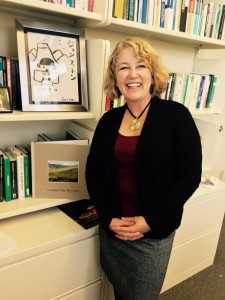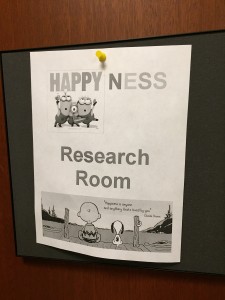sabbatical (n): a break from customary work to acquire new skills or knowledge, traditionally occurring every seventh year
Breaks Away: Sabbatical Stories of Hope
Each academic year, a number of Hope faculty take sabbatical leaves away from the college, submersing themselves for extended periods of time into their favored fields of inquiry. If viewed from above and all together, those fields would look like a calico landscape, so varied and colorful is the topography of their collective research, writing, and creative pursuits. Offering both restoration and adventure, sabbaticals are a bit like information and imagination transfusions. These breaks away from normal classroom and committee work give Hope academicians a boost to reinforce and revitalize their teaching and scholarship.
Spanish-speakers say “feliz.” The Japanese say 幸福, pronounced “kofuku.” In English, “happy” is the word. The delivery may change from language to language, but it is universally agreed upon that happiness means one thing: feeling or showing pleasure or contentment. So, it would seem, happy elucidation remains the same no matter where one lives – whether in Argentina, Honduras, Japan, or the United States, right? Well, maybe not. That’s what Dr. Dede Johnston, professor of communication, is finding out.

Happiness is a choice, psychologists say, but the ways we choose to be happy and how we express that joy can vary from the grandiose to the sublime across cultures. Taking a portion of her yearlong sabbatical to study happy emotions found in thousands of pictorial images of people in six countries, Johnston is quick to relay that what may seem simple to define is actually complex. Happiness does not have one common expression, though we usually think a simple smile will do. Instead, it is individually and culturally discovered and defined. For one person, happiness is simply a sunny day, but for another, it is a high-paying job indicative of a successful career. The individualized nature of the happiness definition, then, makes for a myriad of meanings that are multiplied again by the number of cultures expressing it, setting off a compare-and-contrast exercise of multi-national magnitude. So far, Johnston’s initial findings have been happily enthralling.
“In America, we’re either happy or unhappy. There seems to be little in-between. We also tend to experience happiness as a state of high arousal, or excitement for example,” explains Johnston. “In Japan, happiness is expressed in quieter terms. The Japanese seem to focus on things that Americans take for granted. They are happy for their noodles at lunch; they are happy for their legs. In addition, the Japanese report being simultaneously happy and unhappy, a kind of melancholy or nostalgia. Japanese people are more complex in their metaphoric constructions of happiness, and American people are more complex in their nuanced range and expression of feelings associated with happiness.”

For this massive, qualitative, cross-cultural happiness research project, Johnston joined forces with Dr. Rika Hanamitsu, a linguistics professor from Waseda University in Tokyo, Japan, whom Johnston had worked with for two years while Hanamitsu took her sabbatical leave at Hope. Johnston enlisted research participants while visiting Uruguay, Argentina and Chile on her peripatetic sabbatical. Hope senior, Jean Luc Miralda, a native of Honduras, secured participants there, and Hanamitsu signed up Japanese contributors. The two professors asked those involved to take photos of themselves, five times during a single day, when they experienced happiness. The photo-takers then had to write a prompted narrative response about each of those moments in time. Looking at images of 2,600 different people from four age groups (college-aged to elderly) means Johnston, Hanamitu, and their three Hope research student-assistants have been doing a tremendous amount of story translation and coding of thousands of images. It also means this wide-reaching work is uncovering an exciting, glad array of ways to be happy. And in April, those Hope student-assistants and their professor hope to present the group’s preliminary findings at the National Conference for Undergraduate Research in Asheville, North Carolina.
Not one to allow one topic or continent to confine her sabbatical to-do list for too long, Johnston also took a trip Berlin to develop an interdisciplinary – literature, communication and political science – conjoined course with colleagues in Slovakia and Lebanon; traveled to South Africa to develop a study-tour on “Narratives of Peace and Conflict in Post-Apartheid South Africa;” and, she also co-authored and published an article about another cross-cultural research project, again with Hanamitsu. This time Johnston looked at global exposure and global perceptions of 1,360 college-aged students in China, Japan, Mexico, Saudi Arabia, South Korea, and the U.S. Their work can be read in the Journal of Intercultural Communication.
“I felt it was a year of good productivity for me,” Johnston concludes. “I learned more Spanish, met wonderful people during home stays. Sabbatical to me means creativity, a chance to move ideas — and sometimes I have too many — toward accomplishments.”
Living out of a backpack for a year, researching about global communication issues, even cleaning up her Martha Miller Center office while on sabbatical: that makes Dede Johnston very happy.
—
Dr. Deirdre Johnston is a professor in the Department of Communication at Hope College.

